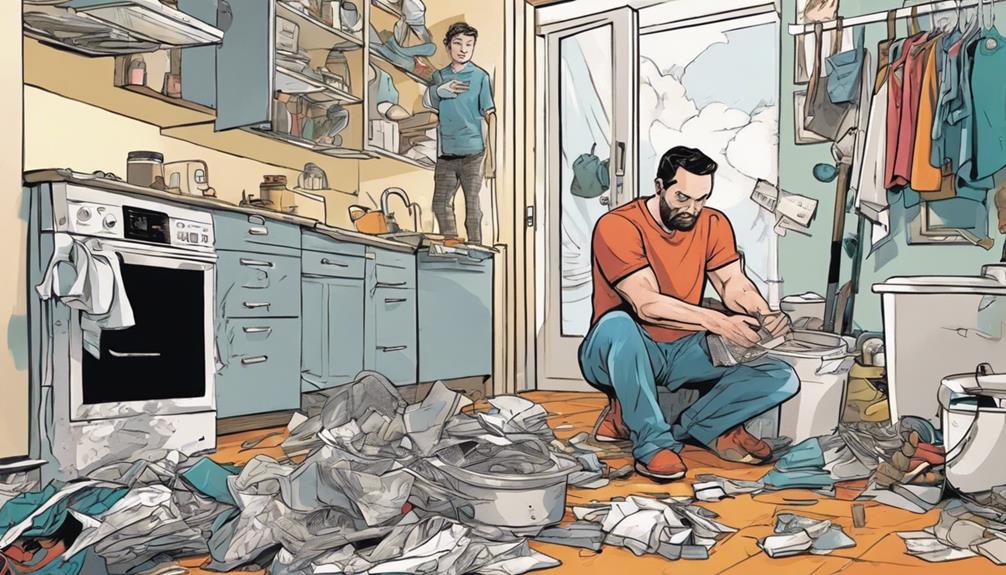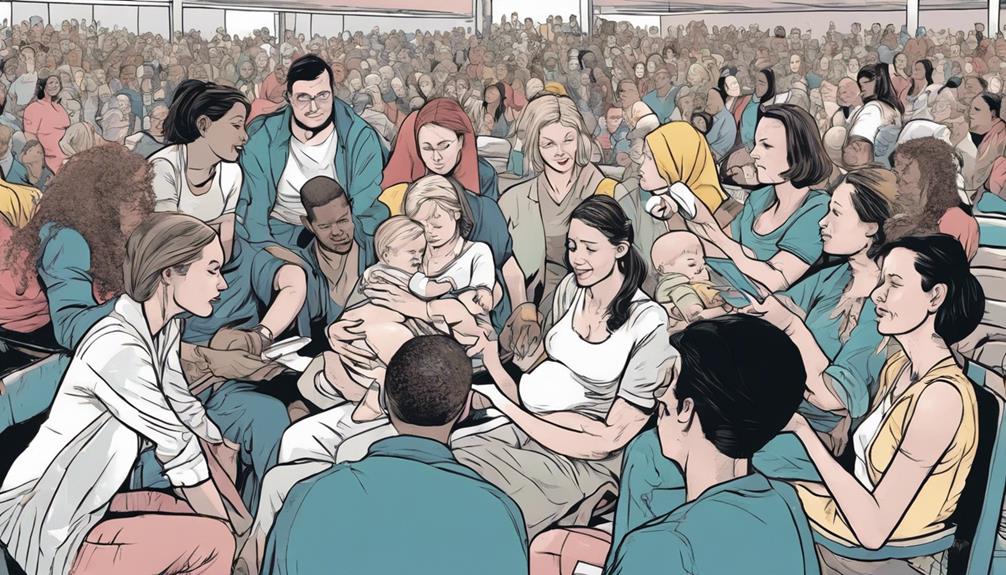Jumping into parent groups felt like hitting a brick wall at first.
Why? Simple. It’s hard to find my footing when the terrain seems designed for moms, not dads like me.
Remembering the time I tried joining that parenting workshop at the local community center last March…
Man, I was the only dad there!!! :/
It felt like walking into a room where everyone knew the rules except me.
I’m sharing this on Modern Dads because it’s a common battle.
It’s not just about being the odd one out. It’s about the vibe, the conversations, and sometimes, the outright exclusion. I’ve lost count of the times I’ve received surprised looks or even, ‘Oh, it’s dad’s day with the baby?’ comments.
It’s funny and sad at the same time. The thing is, these groups are crucial. They’re a lifeline for sharing experiences, getting advice, and just feeling less isolated.
A Day in the Life of a Stay-at-Home Dad
Let me paint you a picture from last Thursday. I was at the park with my five-year-old, Liam. We were having a blast, running around, pretending to be superheroes. Then, it happened. Another kid asked Liam why his dad was always the one playing with him at the park, not his mom.
Liam simply shrugged and said, ‘Because my dad’s the best at being a superhero.’
That moment, right there, made every awkward parent group meeting worth it. It showed me that what we’re doing is not just about fitting in with other parents.
It’s about the impact we have on our kids, being present, and rewriting the narrative of what it means to be a dad today.
Key Takeaways
- Social stigma challenges stay-at-home dads in parent groups.
- Lack of inclusivity hinders diverse perspectives in parenting communities.
- Dads face limited dad-centric activities and resources for support.
- Inadequate resources exist for dads’ parenting needs, creating barriers to involvement.
Challenges Faced by At-Home Dads

Navigating the daily obstacles of societal expectations and personal fulfillment can be a significant challenge for at-home dads. Balancing the demands of childcare, household responsibilities, and personal well-being can take a toll on mental health and work-life balance. As an at-home dad, it’s crucial to prioritize self-care and seek support to navigate these challenges effectively.
Maintaining good mental health is essential for fulfilling your role as a caregiver while also taking care of yourself. The constant juggle of responsibilities can lead to feelings of overwhelm and stress. It’s important to recognize the signs of burnout and seek help when needed. Establishing a routine that includes time for self-care activities, such as exercise or hobbies, can significantly benefit your mental well-being.
Achieving work-life balance as an at-home dad involves setting boundaries, managing time effectively, and seeking assistance when necessary. It’s okay to ask for help from your partner, family members, or friends. Prioritizing tasks, delegating responsibilities, and communicating openly about your needs can help create a more balanced and fulfilling lifestyle. Remember, your well-being is just as important as the well-being of your family.
Impact of Isolation on Fathers
Amidst the challenges faced by at-home fathers, the impact of isolation can significantly affect their well-being and ability to navigate their caregiving role effectively. Being isolated can take a toll on your mental health, leading to feelings of loneliness, stress, and even depression. It may seem like you’re alone in this journey, but many fathers experience similar struggles.
Here are four ways isolation can impact fathers:
- Mental Health: Isolation can contribute to feelings of anxiety and overwhelm, affecting your mental well-being.
- Work-Life Balance: Without a support network, juggling childcare responsibilities and work demands can become even more challenging.
- Emotional Well-being: Lack of social interaction may lead to emotional strain, making it crucial to find ways to stay connected.
- Parenting Challenges: Isolation can make it harder to share parenting experiences, seek advice, and learn from others, affecting your parenting journey.
Social Stigma Surrounding Stay-at-Home Dads

You might’ve noticed that stay-at-home dads often face social stigma for deviating from traditional gender roles. Gender roles dictate that men should be the primary breadwinners, not stay-at-home caregivers. This societal expectation can lead to stereotypes that paint stay-at-home dads as less ambitious or capable. It’s essential to challenge these stereotypes and recognize that parenting is a shared responsibility that transcends gender.
When stay-at-home dads encounter social stigma, it can be isolating and discouraging. They may feel judged or excluded from parent groups, adding to their sense of alienation. However, it’s vital to create a supportive environment where all parents, regardless of gender, feel welcomed and valued. By breaking down these barriers, we can foster a more inclusive and diverse community that celebrates different parenting styles.
As individuals committed to serving others, let’s strive to challenge outdated gender norms and create a more inclusive space for all parents. Together, we can dismantle stereotypes and expectations that limit the full potential of stay-at-home dads.
Lack of Inclusive Parent Group Spaces
Parent groups often unintentionally exclude valuable perspectives and experiences, hindering the creation of inclusive spaces for all caregivers. It’s crucial to recognize that diverse communities bring unique insights and challenges to the table. By fostering inclusive environments, parent groups can become powerful support networks for everyone involved.
To address this issue, it’s essential to actively promote diversity within parent groups. Encouraging caregivers from all backgrounds to participate can enrich discussions and create a more welcoming atmosphere. Embracing different viewpoints not only benefits individual members but also strengthens the collective experience of the group.
Creating inclusive parent group spaces involves actively listening to the needs and concerns of all caregivers. By acknowledging and addressing potential barriers to participation, such as language or cultural differences, parent groups can ensure that everyone feels valued and supported. Remember, the strength of a support network lies in its ability to embrace and celebrate the diverse experiences of all caregivers.
Infrequent Dad-Centric Activities and Topics

Amid efforts to cultivate inclusive parent group spaces, the engagement of dads in activities and discussions centered around their experiences remains infrequent. This lack of dad-centric focus can make it challenging for fathers to connect with others facing similar parenting challenges. Dad bonding activities are essential for creating a supportive community where fathers can share their joys, fears, and uncertainties without judgment. When dad-specific topics are scarce, dads might feel isolated or overlooked in the parenting journey.
To address this issue, parent groups can consider incorporating more dad-centric activities and discussions into their schedules. By offering opportunities for dads to bond over shared experiences, such as father-child outings or workshops tailored to parenting challenges unique to dads, these groups can help fathers feel valued and supported. Encouraging open conversations about fatherhood, relationships, and personal well-being can foster a sense of camaraderie among dads and promote a more inclusive and enriching parent group environment.
Limited Resources for Dads’ Parenting Needs
Struggling to find adequate resources for your parenting needs as a dad can be a common challenge in today’s society. When it comes to fatherhood support and finding the right dad workshops, the options can sometimes feel limited. Here are a few reasons why you might be experiencing this difficulty:
- Lack of Dad-Specific Programs: Traditional parenting resources often cater more towards moms, leaving dads with fewer specialized options.
- Limited Access to Support Groups: Finding local fatherhood support groups can be challenging, making it harder to connect with other dads facing similar experiences.
- Scarce Dad-Centric Workshops: Workshops tailored specifically for dads may not be as prevalent, making it harder to access targeted parenting education.
- Few Resources for Stay-at-Home Dads: Stay-at-home dads may find it particularly challenging to locate resources that address their unique needs and challenges.
Navigating the landscape of parenting resources as a dad can be tough, but rest assured, there are avenues to explore for the support and guidance you seek.
Overcoming Misconceptions About Dads’ Involvement

Overcoming misconceptions about dads’ involvement can lead to a deeper appreciation of the diverse roles fathers play in their children’s lives. Challenging stereotypes that portray fathers as less nurturing or less capable parents than mothers is essential for promoting inclusion within parenting groups. It’s important to recognize that dads bring unique strengths and perspectives to their children’s upbringing. By acknowledging and valuing these differences, we can create a more supportive and diverse parenting community.
Many fathers face preconceived notions that they’re less involved or less interested in parenting than mothers. However, this couldn’t be further from the truth for the vast majority of dads. Fathers are just as capable of providing love, care, and support to their children. By actively challenging these stereotypes and highlighting the active role many dads play in their children’s lives, we can create a more inclusive environment where all parents feel valued and supported.
Let’s work together to break down these misconceptions and celebrate the important contributions dads make in their children’s lives.
Online strategies, such as creating virtual meetups and forums, are instrumental in connecting dads virtually and helping them overcome challenges in joining parent groups. These platforms provide a convenient and accessible way for dads to connect, share experiences, and seek support from the comfort of their own homes.
How Can Joining Parent Groups Help Stay-at-Home Dads Combat Loneliness?
Joining parent groups can be one of the most effective strategies for fighting loneliness for stay-at-home dads. By connecting with other parents facing similar challenges, dads can find support, friendship, and a sense of community. These groups offer opportunities for social interaction, activities, and sharing experiences, ultimately combating feelings of isolation.
Can Joining Parent Groups Help Ease Stay-at-Home Dad Burnout?
Joining parent groups can be one of the most effective ways to ease dad burnout. Connecting with other stay-at-home dads provides a sense of community and support, which can alleviate feelings of isolation and stress. These groups offer valuable resources and advice, contributing to a healthier and more balanced parenting experience.
Conclusion
Dads often feel out of place in parent groups because these spaces aren’t always welcoming to them. It’s about breaking down the barriers with more dad-friendly activities. Making these spaces more inclusive matters because dads play a key role in parenting too.
I’d love to hear from you about your experiences with parent groups. Have you felt welcomed or out of place? Drop your stories in the comments below! And if you found this insight helpful, please share it on social media to help our blog, Modern Dads, reach more people.


Leave a Reply